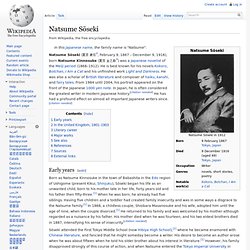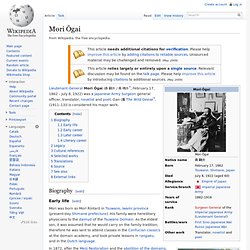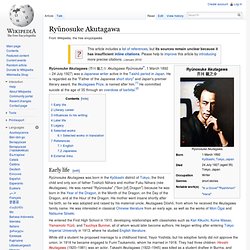

Natsume Sōseki. Early years[edit] Born as Natsume Kinnosuke in the town of Babashita in the Edo region of Ushigome (present Kikui, Shinjuku), Sōseki began his life as an unwanted child, born to his mother late in her life, forty years old and his father then fifty-three.[1] When he was born, he already had five siblings.

Having five children and a toddler had created family insecurity and was in some ways a disgrace to the Natsume family.[1] In 1868, a childless couple, Shiobara Masanosuke and his wife, adopted him until the age of nine, when the couple divorced.[1] He returned to his family and was welcomed by his mother although regarded as a nuisance by his father. His mother died when he was fourteen, and his two eldest brothers died in 1887, intensifying his sense of insecurity. [citation needed] Sōseki attended the First Tokyo Middle School (now Hibiya High School),[2] where he became enamored with Chinese literature, and fancied that he might someday become a writer.
Literary career[edit] Mori Ōgai. Biography[edit] Early life[edit] Mori was born as Mori Rintarō in Tsuwano, Iwami province (present-day Shimane prefecture).

His family were hereditary physicians to the daimyō of the Tsuwano Domain. As the eldest son, it was assumed that he would carry on the family tradition; therefore he was sent to attend classes in the Confucian classics at the domain academy, and took private lessons in rangaku, and in the Dutch language. Mori Ōgai's statue at his birthhouse in Tsuwano In 1872, after the Meiji Restoration and the abolition of the domains, the Mori family relocated to Tokyo. Early career[edit] The cover of the first issue of Shigarami sōshi in October 1889. After graduation, Mori enlisted in the Imperial Japanese Army as a medical officer, hoping to specialize in military medicine and hygiene. Mori Ōgai in military uniform Mori was sent by the Army to study in Germany (Leipzig, Dresden, Munich, and Berlin) from 1884–1888. Later career[edit] Literary career[edit] Legacy[edit] Source[edit] Ryūnosuke Akutagawa. Ryūnosuke Akutagawa (芥川 龍之介, Akutagawa Ryūnosuke?

, 1 March 1892 – 24 July 1927) was a Japanese writer active in the Taishō period in Japan. He is regarded as the "Father of the Japanese short story" and Japan's premier literary award, the Akutagawa Prize, is named after him.[1] He committed suicide at the age of 35 through an overdose of barbital.[2] Early life[edit] He entered the First High School in 1910, developing relationships with classmates such as Kan Kikuchi, Kume Masao, Yamamoto Yūzō, and Tsuchiya Bunmei, all of whom would later become authors. He began writing after entering Tokyo Imperial University in 1913, where he studied English literature. While still a student he proposed marriage to a childhood friend, Yayoi Yoshida, but his adoptive family did not approve the union.
After graduation, he taught briefly at the Naval Engineering School in Yokosuka, Kanagawa as an English language instructor, before deciding to devote his full efforts to writing. Literary career[edit]